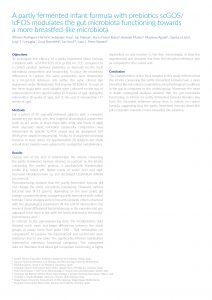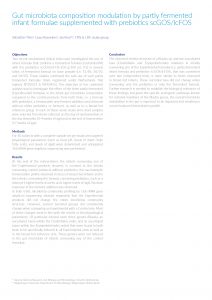Microbiota composition and fecal metabolite profile closer to human milk
 During an oral presentation at ESPGHAN, on May 9, S. Tims presented exciting data from the LIFE clinical study. Next to showing that the microbiota composition was closer to human milk fed infants, he showed that the fecal metabolite profile of infants fed the new infant formula, compared to infants fed the control formula, was also closer to infants fed human milk. [Click on the abstract to read the full text.]
During an oral presentation at ESPGHAN, on May 9, S. Tims presented exciting data from the LIFE clinical study. Next to showing that the microbiota composition was closer to human milk fed infants, he showed that the fecal metabolite profile of infants fed the new infant formula, compared to infants fed the control formula, was also closer to infants fed human milk. [Click on the abstract to read the full text.]
New data from FIPS and LIFE trial
 Infants who were fed the new infant formula with prebiotics and postbiotics had increased Bifidobacterium levels, higher sIgA levels, a lower pH and decreased C. difficile occurrence. Furthermore, untargeted analysis of the microbiome and their metabolites showed that these were closer to human milk fed infants in the group receiving the formula with prebiotics and postbiotics.
Infants who were fed the new infant formula with prebiotics and postbiotics had increased Bifidobacterium levels, higher sIgA levels, a lower pH and decreased C. difficile occurrence. Furthermore, untargeted analysis of the microbiome and their metabolites showed that these were closer to human milk fed infants in the group receiving the formula with prebiotics and postbiotics.
Data from pre-clinical investigations – further support for the concept
 During an oral presentation May 11, I. Renes showed outcomes from pre-clinical trials with the formula with prebiotics and postbiotics. These trials were performed to provide mechanistical understanding for the reduced incidence of colic observed in the clinical studies. Results showed that a formula containing the combination of prebiotics and postbiotics limits stress-induced visceral hypersensitivity compared to control formulas without pre- and postbiotics or without prebiotics. In addition, a formula with the combination of prebiotics and postbiotics appeared to prevent stress-induced gut hyperpermeability.
During an oral presentation May 11, I. Renes showed outcomes from pre-clinical trials with the formula with prebiotics and postbiotics. These trials were performed to provide mechanistical understanding for the reduced incidence of colic observed in the clinical studies. Results showed that a formula containing the combination of prebiotics and postbiotics limits stress-induced visceral hypersensitivity compared to control formulas without pre- and postbiotics or without prebiotics. In addition, a formula with the combination of prebiotics and postbiotics appeared to prevent stress-induced gut hyperpermeability.
About ESPGHAN
The Annual Congress of ESPGHAN took place from Wednesday 9 to Saturday 12 May 2018 in Geneva, Switzerland. During this year’s meeting ESPGHAN celebrated it’s 50 years anniversary with over 4.600 key opinion leaders in the field of Pediatric Gastroenterology, Hepatology and Nutrition from 100 coutries. (New) ideas and knowledge was echanged between different disciplines facilitating research and clinical interdisciplinary collaborations focusing on Pediatric Gastroenterology, Hepatology and Nutrition in over 950 abstracts! Next years’s meeting is in Glasgow, Scotland, from 5-8 June 2019.